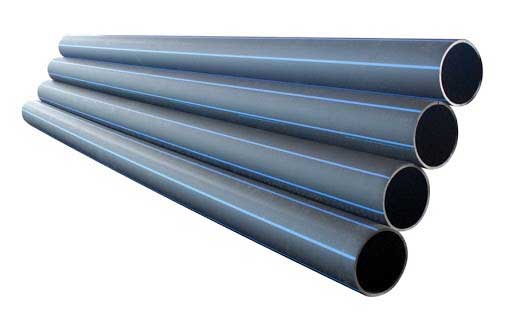In-Depth Look to hdpe pipe fittings Midland TX and Their Applications
Wiki Article
Comprehending the Key Benefits of HDPE Pipeline for Water and Wastewater Monitoring
Making use of HDPE pipeline in water and wastewater monitoring offers various advantages that warrant factor to consider. Its exceptional resilience and lengthy life expectancy make it a preferred selection for numerous jobs. Additionally, the product's resistance to deterioration and chemical damages improves its reliability in different settings. Nevertheless, the advantages extend beyond just long life and resistance. Discovering its cost-effectiveness and environmental impact reveals a lot more compelling factors for its widespread fostering in modern facilitiesPhenomenal Toughness and Durability

HDPE pipeline stands out for its phenomenal sturdiness and longevity, making it a favored selection in water management systems. Built from high-density polyethylene, these pipelines can endure considerable stress and stress, making certain reputable performance over time. Their robust nature allows them to endure severe environmental conditions, including temperature level variations and soil motions, which can create various other products to fall short.
The lifespan of HDPE pipelines usually exceeds 50 years, providing an economical solution for communities and markets alike. Additionally, the product's light-weight residential or commercial properties streamline setup, reducing labor prices and durations. This sturdiness reduces the need for constant fixings or replacements, additionally enhancing its financial allure.
In water management applications, the integrity of HDPE pipes implies less disturbances and enhanced solution connection, making them important to sustainable framework growth. The combination of sturdiness and long life solidifies HDPE's function as a foundation in reliable water administration options.

Resistance to Deterioration and Chemical Damage
While numerous materials catch rust and chemical damages gradually, HDPE pipes exhibit impressive resistance, making them ideal for different water management applications. This strength comes from the molecular framework of high-density polyethylene, which is inherently non-reactive and does not rust like metals or deteriorate from exposure to rough chemicals. Therefore, HDPE is very reliable in environments with aggressive compounds, such as wastewater systems that may consist of acids, bases, and natural solvents.
Additionally, HDPE pipelines can endure ecological elements such as soil level of acidity and saline problems, further enhancing their viability for varied applications (American Plastics HDPE Pipe for Oilfield). Their capability to keep structural stability in time reduces the threat of leakages and failings, which is critical in ensuring the safety and dependability of water distribution and wastewater monitoring systems. As a result, the resistance to rust and chemical damage markedly adds to the general efficiency and durability of HDPE piping remedies
Cost-Effectiveness and Economic Benefits
When thinking about the economic implications of water monitoring systems, the cost-effectiveness of HDPE pipes comes to be apparent. These pipes supply reduced installment and upkeep expenses compared to conventional products like steel or concrete. Their light-weight nature streamlines transport and installment, resulting in minimized labor costs. In addition, HDPE pipelines show a long life expectancy, usually surpassing half a century, which translates to less replacements and long-lasting cost savings.Additionally, the resistance of HDPE to deterioration and chemical damage lessens the requirement for expensive repairs and substitutes. The pipes likewise support reliable water flow, minimizing power prices related to pumping systems. By alleviating leaks and water loss, HDPE pipelines contribute to considerable economic benefits for municipalities and industries alike. On the whole, the preliminary investment in HDPE piping can generate substantial financial returns over the lifespan of the water administration system, making it a sensible option for lasting infrastructure growth.
Ecological Sustainability and Decreased Effect

Versatility and Flexibility in Setup
As a result of their unique residential or commercial properties, HDPE pipes use remarkable versatility and versatility in installment, making them suitable for a large range of applications. Their light-weight nature allows for simpler handling and transport, lowering labor costs and check here installment time. HDPE pipes can be curved and formed to fit numerous terrains and task demands, which is particularly beneficial in testing environments.Additionally, their resistance to rust and chemical damages enables setup in varied setups without the demand for specialized safety layers. The capability to fuse joints creates a continuous, leak-free system, improving the overall integrity and integrity of the installment. HDPE's versatility additionally fits ground movement, decreasing the threat of damage in areas susceptible to shifting soil. Generally, these characteristics make HDPE pipes not only flexible yet also a favored option for water and wastewater administration systems.
Often Asked Concerns
How Does HDPE Pipe Contrast to PVC in Water Administration Applications?
HDPE pipe offers remarkable versatility, resistance to deterioration, and resilience compared to PVC. Its lighter weight assists in less complicated setup, while its lengthy life expectancy lowers substitute costs, making HDPE a recommended selection in water monitoring applications.What Is the Life-span of HDPE Pipes Under Typical Conditions?
Under typical conditions, HDPE pipelines can have a life-span varying from 50 to 100 years. Their resilience and resistance to corrosion add to their long-lasting efficiency in different applications, making them a reliable choice for framework.Are HDPE Pipeline Recyclable After Their Service Life?
Yes, HDPE pipes are recyclable after their life span. custom hdpe pipe manufacturing Midland TX. They can be refined and repurposed right into brand-new items, greatly lowering ecological influence and promoting sustainability within the industry, making them an environmentally friendly choice for piping solutionsWhat Is the Installation Refine for HDPE Pipes?
The installment procedure for HDPE pipelines includes website prep work, trenching, pipe fusion or mechanical joining, backfilling, and pressure testing. Correct methods ensure a durable and reliable system for delivering water and wastewater efficiently.Can HDPE Piping Be Made Use Of for Both Drinkable and Non-Potable Water Systems?
Yes, HDPE pipes can be utilized for both safe and clean and non-potable water systems. Their flexibility, durability, and resistance to corrosion make them suitable for numerous applications, guaranteeing secure and efficient transportation of water in various contexts.Report this wiki page